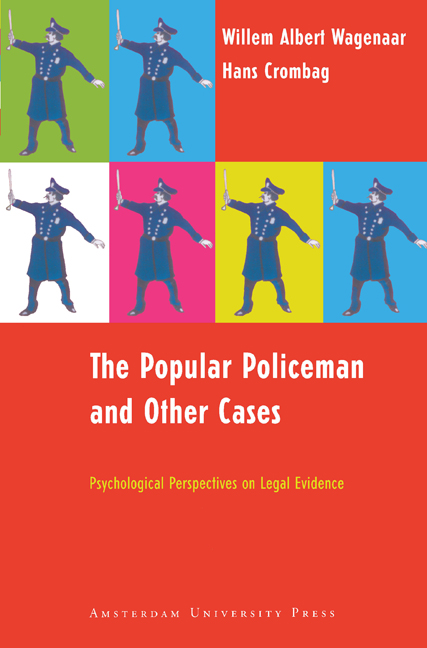Book contents
- Frontmatter
- Contents
- Foreword
- 1 Illegal Gambling or the Victory Travel Club
- 2 On Causal Reasoning or Death in the Warmoesstraat
- 3 Consumer Confusion or Potato Chips and Olive Oil
- 4 Fiction and Reality of ‘the Average Individual’ or the Case of Old Mr. Lane
- 5 Case Histories and Scientific Proof or the Case of JR
- 6 Not a Good Story or the Disappearance of Maddy and Vicky
- 7 Conflicting Scenarios or the Case of the Man who Needed a Companion
- 8 Two Processes Obstructing the Accuracy of Long-Term Memory or the Case of the Stolen Mercedes
- 9 Confessions after Repeated Interrogation or the Putten Murder Case
- 10 Collaborative Storytelling or the Artist’s Models and an Angry Neighbourhood
- 11 Allegation of Sexual Child Abuse in a Case of Disputed Visitation or Cindy's Story
- 12 Psychogenic Amnesia or the Case of the Amnesic Strangler
- 13 Obeying Reflexes or Death on the Climbing Wall
- 14 Visual Acuity or Shooting Mimi the Cat
- 15 Sexual Semiotics or the Case of the Popular Policeman
- Postscript: Psychological Expertise and the Law
- Bibliography
- Name Index
- Subject Index
1 - Illegal Gambling or the Victory Travel Club
Published online by Cambridge University Press: 16 February 2021
- Frontmatter
- Contents
- Foreword
- 1 Illegal Gambling or the Victory Travel Club
- 2 On Causal Reasoning or Death in the Warmoesstraat
- 3 Consumer Confusion or Potato Chips and Olive Oil
- 4 Fiction and Reality of ‘the Average Individual’ or the Case of Old Mr. Lane
- 5 Case Histories and Scientific Proof or the Case of JR
- 6 Not a Good Story or the Disappearance of Maddy and Vicky
- 7 Conflicting Scenarios or the Case of the Man who Needed a Companion
- 8 Two Processes Obstructing the Accuracy of Long-Term Memory or the Case of the Stolen Mercedes
- 9 Confessions after Repeated Interrogation or the Putten Murder Case
- 10 Collaborative Storytelling or the Artist’s Models and an Angry Neighbourhood
- 11 Allegation of Sexual Child Abuse in a Case of Disputed Visitation or Cindy's Story
- 12 Psychogenic Amnesia or the Case of the Amnesic Strangler
- 13 Obeying Reflexes or Death on the Climbing Wall
- 14 Visual Acuity or Shooting Mimi the Cat
- 15 Sexual Semiotics or the Case of the Popular Policeman
- Postscript: Psychological Expertise and the Law
- Bibliography
- Name Index
- Subject Index
Summary
In most countries gambling is regulated by the state, usually through legislation that forbids the commercial organisation of gambling activities, or through legislation that subjects commercial gambling operations to a licensing system. Legislation on gambling must contain a definition of what constitutes gambling. Which games are subject to the legislation, and which ones are exempt because they are considered games of skill? Such definitions are always problematic, because in reality there is no clear dichotomy of gambling games versus non-gambling games. Instead, there is a continuous scale with clear cases, like lotteries and roulette, at one end, and highly skilled games, like tennis or chess, at the other. The legally interesting cases are those in the middle, where there is uncertainty about the true nature of the game. There we find cases like blackjack and poker, in which professional players may earn considerable sums of money, which implies that skill is relevant, whereas beginners often lose because, lacking the relevant skills, they gamble. The dependence of the outcomes on the way in which individual players play leads almost automatically to a definition of gambling not in terms of the formal characteristics of the game, but in terms of how it is actually played. In that case, legislation on gambling should define the class of behaviours that constitute gambling, which almost inevitably leads to the involvement of psychological insights and concepts. As the case of the Victory Travel Club, discussed in this chapter, was tried in the Netherlands, it will be helpful to look at the definition of gambling according to Dutch law.
Dutch gambling legislation distinguishes between games of chance and games of skill. A game of chance is a game in which the large majority of the players do not have a decisive influence on the outcome upon which the winning of a prize is contingent. There are two vague elements in this definition: large majority and decisive influence. Which proportion of players qualifies as a large majority, and how should the proportion of these unskilled players be measured in an actual case? And what constitutes a decisive influence? Decisive in what sense?
- Type
- Chapter
- Information
- The Popular Policeman and Other CasesPsychological Perspectives on Legal Evidence, pp. 9 - 24Publisher: Amsterdam University PressPrint publication year: 2012



